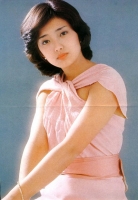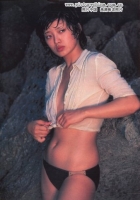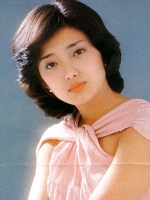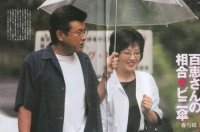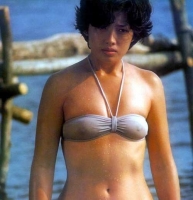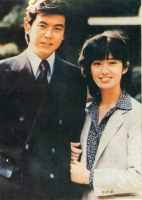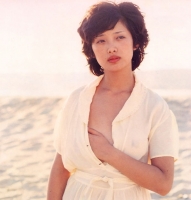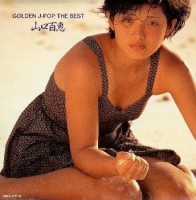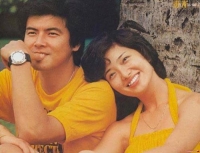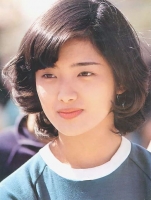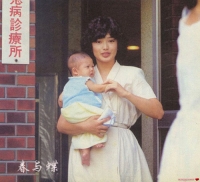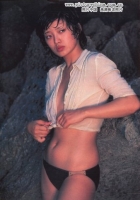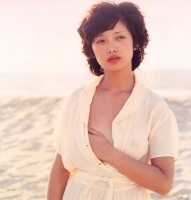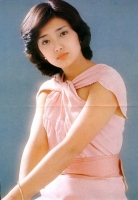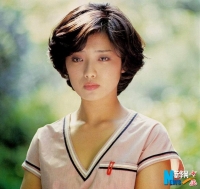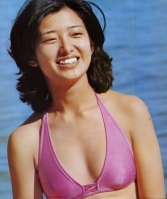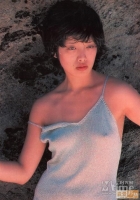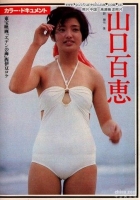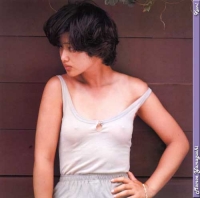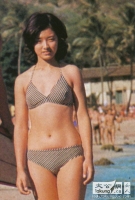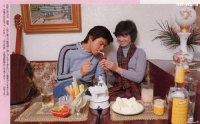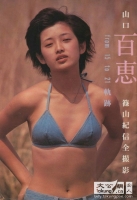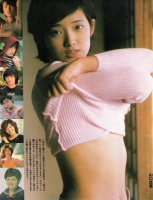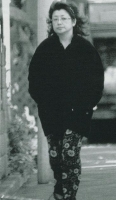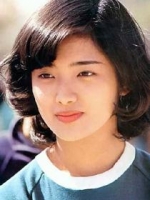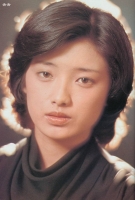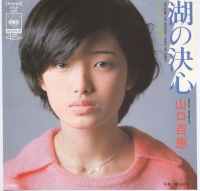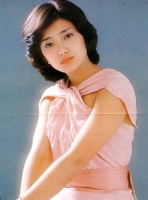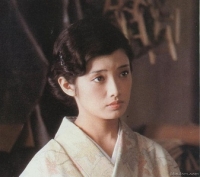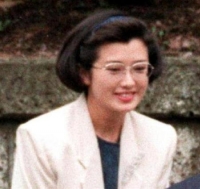阅读山口百惠 Yamaguchi Momoe在影视与戏剧的作品!!! | |||
1972年第五届“明星诞生”歌唱比赛中,以《回转木马》一曲获得第二名。1973年,首次主演了松竹公司市村泰一执导的影片《正当青春》。1975年,与三浦友和主演电影《潮骚》,两人陷入热恋;这部电影的导演西河曾透露,当年拍《潮骚》时,山口百惠常常一早到现场,他还取笑地问百惠是否想早点见三浦友和。1979年1月,三浦友和在夏威夷向山口百惠求婚,山口百惠答应了,并且表示“如果结婚,我打算辞掉公司的工作。”。1980年,出版唱片〈谢肉祭〉、〈寡妇摇滚曲〉、〈在再见的路旁〉。1980年,影片《古都》上映。
1980年10月5日,正值颠峰的山口百惠在日本武道馆舞台上像仙女一样出现在大家面前,放下麦克风,宣布引退,1980年11月19日与三浦友和结婚,婚礼在东京都港区的霊南坂教会举行,证婚人是宇津井健。翌日,飞往夏威夷渡蜜月;她的急流涌退,让当时在场的所有观众无不怅惋唏嘘,甚至泪流满面。婚后育有二子。长子祐太朗是日本乐队 Peaky SALT 的主音歌手,次子贵大是一名演员。
简介
1972年:山口百惠(やまぐち ももえ)于第五届“明星诞生”歌唱比赛中以《回转木马》一曲获得第二名。
1973年:成为日本的偶像歌星,所唱的《一夏的经验》、《秋樱》、《曼珠沙华》等歌曲至今仍被传唱。
1974年:主演的第一部电影《伊豆的舞娘》上映。
1974年:其主演的电视剧《血疑》放映并受到广泛好评,使罕见的“Rh阴性AB型”血几乎家喻户晓。
1975年:《逝风残梦》上映。
1976年:三浦友和第一次向山口百惠表示爱意。
1977年:《雾之旗》上映。
1979年1月:三浦友和在夏威夷向山口百惠求婚。
1980年:《古都》上映。
1980年10月5日:宣布引退。此时的山口百惠已经人气盛极,在东亚地区享有很高知名度。
1980年11月19日:与三浦友和举行婚礼,是年山口百惠21岁。证婚人:宇津井健。翌日,飞往夏威夷渡蜜月。
1983年:长子裕太郎出生。
1984年:次子贵大君出生。
2003年6月:纪念出道30周年的专辑《MOMOEPREMIUM》发行。
2006年1月:结集出道至引退之现场演唱会套装CD《MOMOE LIVE PREMIUM》发行。
主要作品
歌曲
としごろ(1973年5月21日)
作词:千家和也、作曲:都仓俊一、编曲:都仓俊一
青い果実(1973年9月1日)
作词:千家和也、作曲:都仓俊一、编曲:马饲野康二
禁じられた游び(1973年11月21日)
作词:千家和也、作曲:都仓俊一、编曲:马饲野康二
春风のいたずら(1974年3月1日)
作词:千家和也、作曲:都仓俊一、编曲:马饲野俊一
ひと夏の経験(1974年6月1日)
作词:千家和也、作曲:都仓俊一、编曲:马饲野康二
ちっぽけな感伤(1974月9月1日)
作词:千家和也、作曲:马饲野康二、编曲:马饲野康二
冬の色(1974年12月10日)
作词:千家和也、作曲:都仓俊一、编曲:马饲野康二
湖の决心(1975年3月21日)
作词:千家和也、作曲:都仓俊一、编曲:森冈贤一郎
夏ひらく青春(1975年6月10日)
作词:千家和也、作曲:都仓俊一、编曲:穂口雄右
ささやかな欲望(1975年9月21日)
作词:千家和也、作曲:都仓俊一、编曲:马饲野康二
白い约束(1975月12月21日)
作词:千家和也、作曲:三木たかし、编曲:萩田光雄
爱に走って(1976年3月21日)
作词:千家和也、作曲:三木たかし、编曲:萩田光雄
横须贺ストーリー(1976年6月21日)
作词:阿木耀子、作曲:宇崎竜童、编曲:萩田光雄
パールカラーにゆれて(1976年9月21日)
作词:千家和也、作曲:佐瀬寿一、编曲:船山基纪
赤い冲击(1976年11月21日)
作词:千家和也、作曲:佐瀬寿一、编曲:马饲野康二
初恋草纸(1977年1月21日)
作词:阿木耀子、作曲:宇崎竜童、编曲:萩田光雄
梦先案内人(1977年4月1日)
作词:阿木耀子、作曲:宇崎竜童、编曲:萩田光雄
イミテイション・ゴールド(1977年7月1日)
作词:阿木耀子、作曲:宇崎竜童、编曲:萩田光雄
秋桜(1977年10月1日)
作词:佐田雅志 (ja:さだまさし)、作曲:佐田雅志、编曲:萩田光雄
赤い绊<レッド・センセーション>(1977年12月21日)
作词:松本隆、作曲:平尾昌晃、编曲:川口真
乙女座宫(1978年2月1日)
作词:阿木耀子、作曲:宇崎竜童、编曲:萩田光雄
プレイバックPart2(1978年5月1日)1978年的NHK红白歌合战红组压轴曲目。
作词:阿木耀子、作曲:宇崎竜童、编曲:萩田光雄
绝体绝命(1978年8月21日)
作词:阿木耀子、作曲:宇崎竜童、编曲:萩田光雄
いい日旅立ち(1978年11月21日)
作词:谷村新司、作曲:谷村新司、编曲:川口真
美・サイレント(1979年3月1日)
作词:阿木耀子、作曲:宇崎竜童、编曲:萩田光雄
爱の岚(1979年6月1日)
作词:阿木耀子、作曲:宇崎竜童、编曲:萩田光雄
しなやかに歌って(1979年9月1日)
作词:阿木耀子、作曲:宇崎竜童、编曲:川口真
爱染桥(1979年12月21日)
作词:松本隆、作曲:堀内孝雄、编曲:萩田光雄
谢肉祭(1980年3月21日)
作词:阿木耀子、作曲:宇崎竜童、编曲:大村雅朗
ロックンロール・ウィドウ(1980年5月21日)
作词:阿木耀子、作曲:宇崎竜童、编曲:萩田光雄
さよならの向う侧(1980年8月21日)
作词:阿木耀子、作曲:宇崎竜童、编曲:萩田光雄
一恵(1980年11月19日)
作词:横须贺恵(山口百恵)、作曲:谷村新司、编曲:萩田光雄
演出
电影
主演14部电影
伊豆的舞娘(1974年)同三浦友和一起主演
潮骚(1975年) 同三浦友和一起主演
绝唱(1975年) 同三浦友和一起主演
エデンの海(1976年)
风立ちぬ(1976年)同三浦友和一起主演
春琴抄(1976年)同三浦友和一起主演
泥だらけの纯情(1977年)同三浦友和一起主演
雾之旗(1977年)同三浦友和一起主演
ふりむけば爱(1978年)同三浦友和一起主演
炎之舞(1978年)同三浦友和一起主演
ホワイト・ラブ(1979年)同三浦友和一起主演
天使を诱惑(1979年)同三浦友和一起主演
古都(1980年、引退记念作品)同三浦友和一起主演
电视剧
欢笑的容颜(ja:颜で笑って)(TBS系 1973年10月~74年3月 全26话)
红色系列(ja:赤いシリーズ)
红色的迷路(ja:赤い迷路)(1974年10月~1975年3月)赤いシリーズ第1作
血疑(赤的疑惑,ja:赤い疑惑)(1975年~1976年)同三浦友和一起主演
红色的命运(ja:赤い运命)(1976年)
红色的冲击(ja:赤い冲击)(1976年~1977年) 赤いシリーズで初めての主演。同三浦友和一起主演
红色的绊(ja:赤い绊)(1977年~1978年)
红色的死线(ja:赤い死线)(1980年11月7日、同月14日)赤いシリーズ最终作。原作はウィリアム・アイリッシュ‘暁の死线’。同三浦友和一起主演
刑事くん2(1973年、TBS) - ドラマ初出演作品(ワンカットのみ)
野菊之墓(ja:野菊の墓)(1977年7月9日)テレビ朝日系列土曜ワイド剧场
飞啊!孙悟空(ja:飞べ!孙悟空)(1977年、TBS)
人はそれをスキャンダルという(1978年、TBS)
もうさみしくなんかないぞ(1980年、フジテレビ)
ほか
CM
グリコアーモンドチョコレート・プリッツ・セシルチョコレート同三浦友和一起主演
富士ヨット
旺文社
富士胶片
花王
丰田汽车
卡西欧
著书
‘苍い时’(苍茫时分) 集英社 1981年1月ISBN 978-408751056
Biography
Momoe was born in Tokyo, Japan in 1959. Not long after she was born she was left in the care of her maternal grandparents, of whom she has said she has many fond memories. At around 4 years old she was returned to her parents and the family then moved to Yokohama. At an early age her father left, and her mother became a single parent to her two daughters, Momoe and her little sister Toshie. The family moved once again to Yokosuka, where they would stay until Momoe rose to stardom. It is the place she considers home, shown in one of her most popular album tracks "I CAME FROM Yokosuka" (I CAME FROM 横須賀) from her 11th album "Momoe Hakusho" (百恵白書).
At the end of 1972 Momoe appeared on the idol talent search television show "A Star is Born" (スター誕生, sutā tanjō) at the age of 13. She sang the song "Kaiten Mokuba" (回転木馬, meaning "Merry-go-round"), originally a hit for Yumi Makiba (牧葉ユミ, Makiba Yumi) earlier that year. Though she only came in second place, she still received several deals, and chose a record contract releasing under CBS/Sony.
Her first single, titled "Toshigoro" (としごろ), coupled with her first movie of the same name, did not fare very well in the charts, peaking at a low 37 on the oricon. It wasn't until her second single "Aoi Kajitsu" (青い果実, which has been translated into either "unripe fruit", "blue fruit" or "green fruit") that she really became popular. That single broke the top 10 and peaked at number 9. Momoe fans and Japanese pop culture historians alike have accredited the suggestive lyrics of the song to its success. The chorus goes "You can do what ever you want with me, it's ok if rumors spread that I'm a bad girl" (Japanese: "あなたが望むなら、私何をされてもいいわ。いけない娘だと噂されてもいい" anata ga nozumu nara, watashi nani o sarete mo ii wa. ikenai musume da to uwasa sarete mo ii). All of this coming from a 13 year old Momoe.
This trend carried on in her career for quite a while. One of her biggest hits, and most memorable songs to this day, is her 5th single "Hito natsu no Keiken" (ひと夏の経験, "an experience one summer"), which includes lyrics like "I'll give you the most precious thing a girl has" (あなたに女の子の一番大切なものをあげるわ Anata ni onna no ko no ichiban taisetsu na mono wo ageru wa) and "Everyone experiences it at least once, The sweet trap of temptation" (誰でも一度だけ経験するのよ 誘惑の甘い罠, dare demo ichido dake keiken suru no yo/yūwaku no amai wana).
As time went on, Momoe gained more and more control over her career and strayed away from the songs with suggestive lyrics and went for songs more about a woman being strong and independent. These changes produced some of her most popular and memorable hits, such as "Cosmos" (秋桜, kosumosu, an autumn flower in Japan), "Ii Hi Tabidachi" (いい日旅立ち), and "Sayonara no Mukō Gawa" (さよならの向う側) all of which are covered frequently to this day. The most popular single she ever released was "Yokosuka STORY" (横須賀ストーリー) in 1976, which sold more than 600,000 copies and peaked at number one on the charts.
Her ever growing popularity in the music industry, was paralleled by rising success in film industry. Her second film, "Izu no Odoriko" (伊豆の踊子 "The Dancing Girl of Izu") based on the short story by Nobel Prize winning author Yasunari Kawabata, introduced her to actor Tomokazu Miura. Though Momoe at the time was just 14, and Tomokazu was 22, they hit it off and had great screen chemistry. They starred together in a total of 14 of her 17 movies , one every winter and summer. In 1980, their last cinematic outing brought them back to a work by Kawabata, Koto (古都 The Old Capital), based on the novel of the same title.
Near the end of her career Momoe became very sophisticated in her music. Much like the Beatles, who started out without much artistic experimentation, but ended with influential musical production, Momoe's later career possesses many changes which are not typical of pop idols. Because she wanted to make a rock song before she ended her career, "Rock 'n Roll Widow" was produced, which was included on the concept album Moebius's Game (メビウス・ゲーム). Her 21st album, "Phoenix Densetsu" (不死鳥伝説), was, in fact, written as a rock opera. Her 12th and 18th albums, "GOLDEN FLIGHT" and "L.A. Blue", which were both recorded overseas (in London and Los Angeles respectively) include heavy influences of the music of the country they were recorded in. Overall the sound of her later songs and albums have a much more mature and complex sound than her early songs.
Along with the constant on screen romance between Momoe and Tomokazu Miura, an off screen romance grew. During a trip to Hawaii in early 1979, Tomokazu proposed to Momoe. She accepted, and she also said that she would retire from the entertainment industry to marry him. Momoe officially announced their relationship at a concert in October 1979, and the official announcement about their marriage date and her retirement was made in March 1980. Within eight months after the announcement, she gave her farewell concert at the famous Nippon Budokan on October 5, 1980, released her last album "This is my trial" on October 21, 1980, and released her last single "Ichi E" (一恵) on November 19, 1980.
On October 15, 1980, Momoe officially retired from show business, and on November 19, 1980, Momoe and Tomokazu were married. Though rumors have been circulating since her retirement that she would come back, she has devoted herself to being a homemaker and mother to two sons ever since her retirement.
In 2002, during an interview, Momoe claimed herself to be a descendant of Yang Guifei.
Yang Guifei (Concubine Yang Yuhuan) was one of the Four Beauties of Ancient China. After investigations, Momoe was found indeed to be from a Yang village in China. However, Yang Guifei was not known to have borne any children, although there are Japanese rumours that she escaped to Japan. Thus, that was the closest Momoe could get to the famous beauty Yang Guifei.
Discography
Album
Yamaguchi Momoe's First Album "Toshigoro" (山口百恵ファーストアルバム としごろ, 21 August 1973)
Yamaguchi Momoe's Second Album "Aoi Kajitsu" ("blue fruit") /"Kinjirareta Asobi" ("forbidden play") (山口百恵セカンドアルバム 青い果実/禁じられた遊び, 21 December 1973)
15sai no Theme Momoe no Kisetsu (15才のテーマ 百恵の季節, 21 April 1974)
15sai no Theme Hito Natsu no Keiken (15才のテーマ ひと夏の経験, 1 August 1974)
15sai (15才, 10 December 1974)
16sai no Theme (16才のテーマ, 1 May 1975)
Sasayaka na Yokubō (ささやかな欲望, 5 December 1975)
17sai no Theme (17才のテーマ, 21 April 1976)
Yokosuka Story (横須賀ストーリー, 1 August 1976)
Pearl-Color ni Yurete (パールカラーにゆれて, 5 December 1976)
Momoe Hakusho (百恵白書, 21 May 1977)
GOLDEN FLIGHT (21 August 1977)
Hana Zakari (花ざかり, 5 December 1977)
COSMOS/ (COSMOS/宇宙, 1 May 1978)
Dramatic (ドラマチック, 1 September 1978)
Hatachi no Kinenbei Manjushaka (二十歳の記念碑 曼珠沙華, 21 December 1978)
A FACE IN THE VISION (1 April 1979)
L. A. Blue (1 August 1979)
Haru Tsuge Dori (春告鳥 , 1 February 1980)
Mobius's Game (メビウス・ゲーム, 21 May 1980)
Phoenix Densetsu (不死鳥伝説 , 21 August 1980)
This is My Trial (21 October 1980)
Single
Toshigoro ("Adolescence") (としごろ, 21 May 1973)
Aoi Kajitsu ("Blue fruit") (青い果実, 1 September 1973)
Kinjirareta Asobi ("Forbidden play") (禁じられた遊び, 21 November 1973)
Haru Kaze no Itazura ("Spring wind's tease") (春風のいたずら, 1 March 1974)
Hito Natsu no Keiken ("A one summer experience") (ひと夏の経験, 1 June 1974)
Chippoke na Kanshō ("Tiny Sentiment") (ちっぽけな感傷, 1 September 1974)
Fuyu no Iro ("Winter Colors") (冬の色, 10 December 1974)
Mizuumi no Kesshin ("Resolution strong as lake") (湖の決心, 21 March 1975)
Natsu Hiraku Seishun (夏ひらく青春, 10 June 1975)
Sasayaka na Yokubō ("Modest desire") (ささやかな欲望, 21 September 1975)
Shiroi Yakusoku ("White promise") (白い約束, 21 December 1975)
Ai ni Hashitte ("Running to love") (愛に走って, 21 March 1976)
Yokosuka Story (横須賀ストーリー, 21 June 1976)
Pearl-Color ni Yurete ("Swaying in Pearl-color") (パールカラーにゆれて, 21 September 1976)
Akai Shōgeki ("Red Shock") (赤い衝撃, 21 November 1976)
Hatsukoi Sōshi ("First love storybook") (初恋草紙, 21 January 1977)
Yumesaki Annainin (夢先案内人, 1 April 1977)
Imitation Gold (イミテイション・ゴールド, 1 July 1977)
Cosmos (秋桜, 1 October 1977)
Akai Kizuna (Red Sensation) (赤い絆 (レッド・センセーション), 21 December 1977)
Otomeza Kyū ("The Constellation Virgo") (乙女座宮, 1 February 1978)
Playback part 2 (プレイバックpart 2, 1 May 1978)
Zettai Zetsumei ("Desperate situation") (絶体絶命, 21 August 1978)
Ii Hi Tabidachi ("Leaving on a good day") (いい日旅立ち, 21 November 1978)
Bi Silent ("Be silent")(美・サイレント, 1 March 1979)
Ai no Arashi ("Storm of love")(愛の嵐, 1 June 1979)
Shinayaka ni Utatte ("Supple singing") (しなやかに歌って, 1 September 1979)
Aizenbashi (愛染橋, 21 December 1979)
Shanikusai ("The carnival") (謝肉祭, 31 March 1980)
Rock 'n' Roll Widow (ロックンロール・ウィドウ, 21 May 1980)
Sayonara no Mukō Gawa ("The other side of goodbye")(さよならの向う側, 21 August 1980)
Ichie (一恵, 19 November 1980)
Ireland / Irish singing sisters The Nolans released an album of songs entitled "The Nolans Sing Momoe" which was repackaged and re-issued in 2005.
Screen appearance
Film
Toshigoro (としごろ)
Izu no odoriko (1974 film) (伊豆の踊子) (film version of the short story The Dancing Girl of Izu by Yasunari Kawabata).
Shiosai (潮騒)
Hana no Kou no Trio Hatsukoi Jidai (花の高2トリオ 初恋時代)
Zesshō (絶唱) (1975)
Eden no Umi (エデンの海)
Kaze tachinu (風立ちぬ)
Shunkinshō (春琴抄)
Doro darake no Junjō (泥だらけの純情)
Kiri no Hata (霧の旗)
Furimukeba Ai (ふりむけば愛)
Honō no Mai (炎の舞)
White Love (ホワイト・ラブ)
Tenshi o Yuwaku (天使を誘惑)
Koto (古都) (film version of the novel The Old Capital by Yasunari Kawabata).
Performance
Masako, Junko, Momoe - Namida no Sotsugyō Shiki Shuppatsu (昌子・淳子・百恵 - 涙の卒業式 出発)
Television
Serial Dramas:
Kao de Waratte (顔で笑って)
Genka TV Shōsetsu "Akari no Urumu Koro" (銀河テレビ小説 「灯のうるむ頃」)
Akai Meiro (赤い迷路)
Akai Giwaku (赤い疑惑)
Akai Unmei (赤い運命)
Akai Shōgeki (赤い衝撃)
Akai Kizuna (赤い絆)
Hito wa Sore wo Scandal to Iu (人はそれをスキャンダルという)
Yamaguchi Momoe Intai Kinen Special Drama "Akai Shisen" (山口百恵引退記念スペシャルドラマ「赤い死線」)
